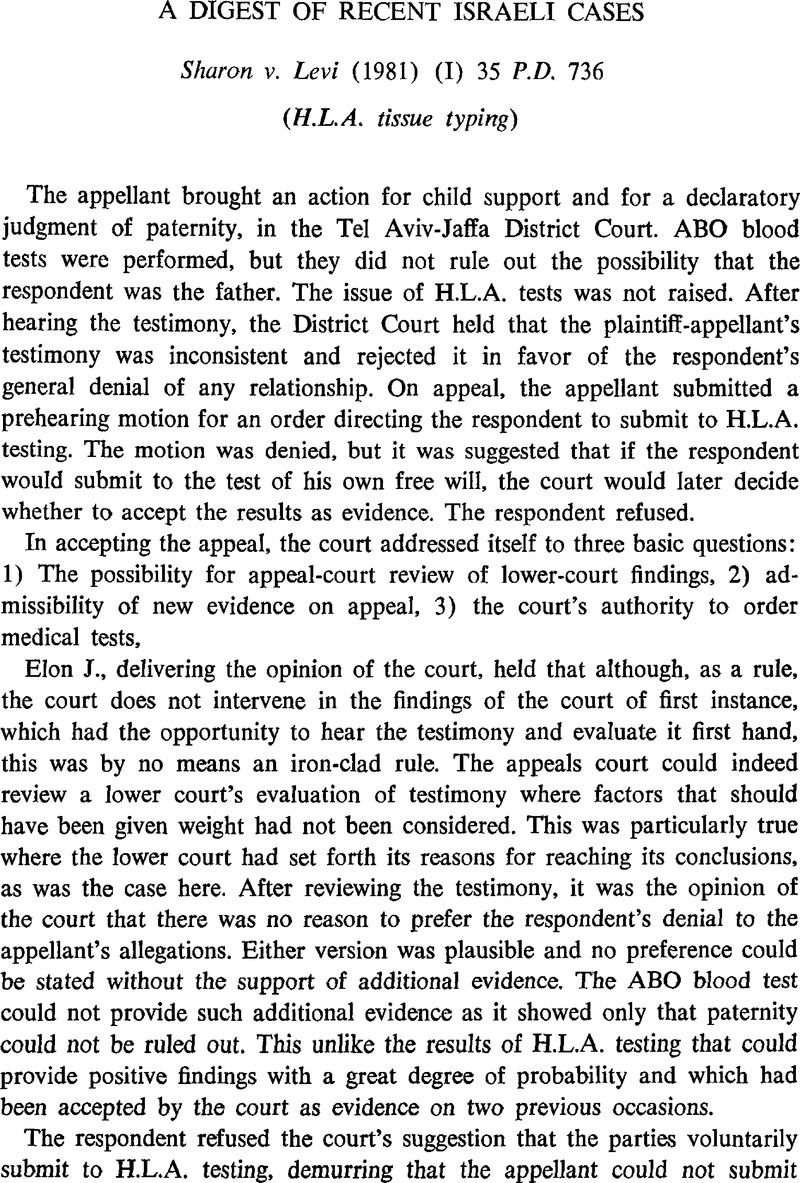No CrossRef data available.
Article contents
A Digest of Recent Israeli Cases
Published online by Cambridge University Press: 12 February 2016
Abstract

- Type
- Notes
- Information
- Copyright
- Copyright © Cambridge University Press and The Faculty of Law, The Hebrew University of Jerusalem 1982
References
page 105 note 1 Family Law Reform Act, 1969.
Sec. 20(1):
“In any civil proceedings in which the paternity of any person fails to be determined by the court hearing the proceedings, the court may, on an application by any party to the proceedings, give a direction for the use of blood tests to ascertain whether such tests show that a party to the proceedings is or is not thereby excluded from being the father of that person and for the taking, within a period to be specified in the direction, of blood samples from that person, the mother of that person and any party alleged to be the father of that person or from any, or any two, of those persons.
(2) Subject to the provisions of subsections (3) and (4) of this section, a blood sample which is required to be taken from any person for the purpose of giving effect to a direction under section 20 of this Act shall not be taken from that person except with his consent.”
Sec. 23(1):
“Where a court gives a direction under section 20 of this Act and any person fails to take any step required of him for the purpose of giving effect to the direction, the court may draw such inferences, if any, from that fact as proper in the circumstances.”
page 105 note 2 Cf. S. v. McC; W. v. W. [1972] A.C. 24; [1970] 1 All E.R. 1162 per Lord Reid at p. 43:
“There is no doubt that a person of full age and capacity cannot be ordered to undergo a blood test against his will. In my view, the reason is not that he ought not to be required to furnish evidence which may tell against him. By discovery of documents and in other ways the law often does this. The real reason is that the English law goes to great lengths to protect a person of full age and capacity from interference with his personal liberty… It is true that the matter is regarded differently in the United States… But here Parliament has clearly endorsed our view by the provisions of section 21(1) of the Act of 1969.”
page 107 note 3 See: Wigmore, J.H., A Treatise on the Anglo-American System of Evidence in Trials at Common Law (Boston, 3rd ed., 1940) vol. II, pp. 166–181.Google Scholar
page 108 note 1 Yoran, A., “Duties of Directors—Enforcement and Insurance Against It” (1979) 9 Mishpatim 453, 469 et seq.Google Scholar
page 108 note 2 Kornfeld v. Shmuelov et al. (1967) (I) 21 P.D. 310. The facts of the case were as follows: The directors of a company—a cobbler and a flooring manufacturer—had purchased the company in order to construct an apartment building on a parcel of land registered in the company's name. Neither of the directors had any prior knowledge of the construction trade. The work was subcontracted to private contractors and no provision was made for supervision of the construction. After a number of years, as the result of heavy rains, serious defects arose in the flats. As the plaintiffs were not original owners of the flats, there was no contractual privity between the parties. Rather, responsibility was founded upon implied warranty and the directors were held personally liable for negligence.
page 108 note 3 Op. cit., at 317.
page 108 note 4 British Canadian v. Oren at p. 259.
page 108 note 5 Sherf et al. v. Klein et al. (1958) 12 P.D. 507, 509.
page 108 note 6 See Palmer, F.B., Palmer's Company Law (London, 22nd ed., 1967) p. 683Google Scholar, sec. 62–65.




